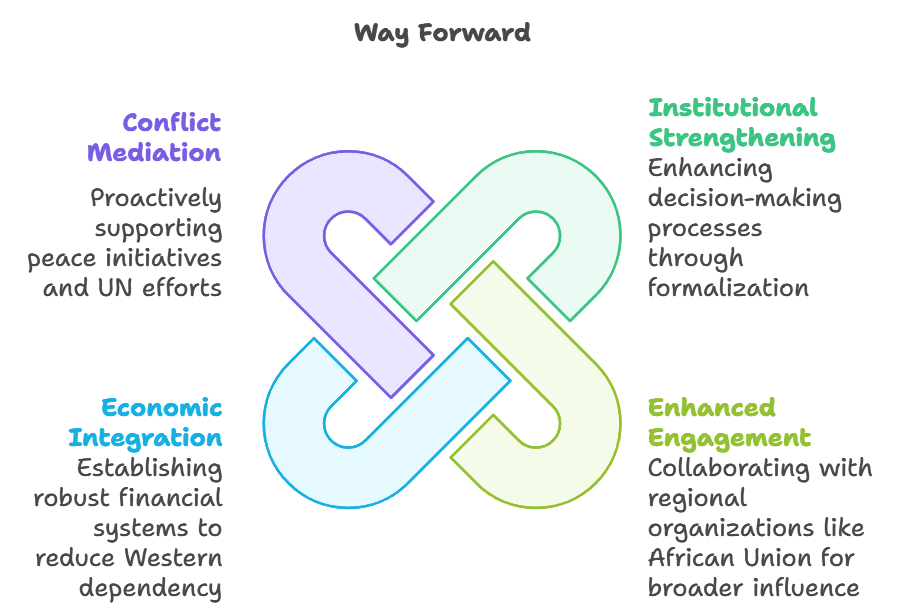-
Q. Evaluate the effectiveness of BRICS as a platform for addressing Global South concerns in international forums. (150 words)
05 Nov, 2024 GS Paper 2 International RelationsApproach
- Introduce by providing a brief overview of BRICS
- Give role of BRICS in addressing global south concerns
- Delve into key challenges
- Suggest a way forward
- Conclude suitably.
Introduction
BRICS (Brazil, Russia, India, China, South Africa, Egypt, Ethiopia, Iran and the United Arab Emirates) has emerged as a prominent platform representing the Global South, advocating for a more equitable world order and addressing the interests of emerging economies.
- Founded in 2009, BRICS works to counterbalance Western-dominated international systems and address pressing issues for developing nations, from economic resilience to sustainable development.
Body
Role of BRICS in Addressing Global South Concerns:
- Advocacy for a Fairer International Order: At the 16th BRICS Summit recently, the Kazan Declaration emphasized the need for reform within the IMF to better reflect emerging economies, highlighting BRICS's advocacy for a fairer financial system.
- By calling for reforms in decision-making processes, it ensures that the concerns of the Global South are considered.
- Promotion of Multilateralism and Peaceful Conflict Resolution: BRICS promotes peaceful conflict resolution based on respect for national sovereignty and adherence to the United Nations Charter.
- In the Kazan Declaration, BRICS reiterated its commitment to multilateralism, calling for diplomatic solutions to the Russia-Ukraine conflict and expressing concern over the humanitarian crisis in Palestine.
- Strengthening Financial Independence Through Dedollarization: Recognizing the volatility of relying on the U.S. dollar, BRICS has advanced dedollarization initiatives aimed at creating an independent financial ecosystem.
- The recent BRICS summit saw agreements to boost transactions in local currencies and discussed a gold-backed BRICS digital currency.
- Promotion of Sustainable Development and Food Security: BRICS prioritizes sustainable development initiatives tailored to the needs of emerging nations, including collaborative programs in health, energy, and food security.
- The Kazan Declaration supported the establishment of a BRICS Grain Exchange, designed to improve food security through efficient grain trading.
- Support for Health and Environmental Initiatives: BRICS has advanced health initiatives that benefit the Global South, particularly in pandemic preparedness and vaccine research.
- The BRICS R&D Vaccine Center and the Integrated Early Warning System for infectious diseases highlight the bloc's proactive stance on health security.
- Economic Cooperation and Trade Expansion: BRICS enhances South-South cooperation through initiatives that increase trade and investment among member states.
- The BRICS Pay project aims to facilitate seamless transactions between member states, reducing transaction costs and bolstering economic collaboration among Global South nations.
Key Challenges in Addressing Global South Concerns:
- Internal Divergences: Differing national interests, particularly between China and India, sometimes dilute the efficacy of BRICS as a cohesive bloc.
- These internal dynamics occasionally hinder unified action in addressing global issues.
- Limited Global Influence: Despite its potential, BRICS lacks formal trade and investment agreements
- Its influence often depends on consensus-building and diplomatic advocacy, which can limit its impact on global policy.
- Economic Disparities among Members: Economic asymmetries among BRICS members, particularly between China and the rest, raise concerns over China’s dominance, which could affect the bloc’s effectiveness as a truly representative body for the Global South.
Conclusion
BRICS has proven to be a valuable platform for voicing the concerns of the Global South, with initiatives aimed at financial independence, multilateral reforms, and sustainable development. For BRICS to further consolidate its role, it must strengthen its institutional capacity, foster deeper economic ties, and position itself as a credible mediator in global conflicts, thereby enhancing its impact on global governance and the aspirations of the Global South.
To get PDF version, Please click on "Print PDF" button.
Print PDF





